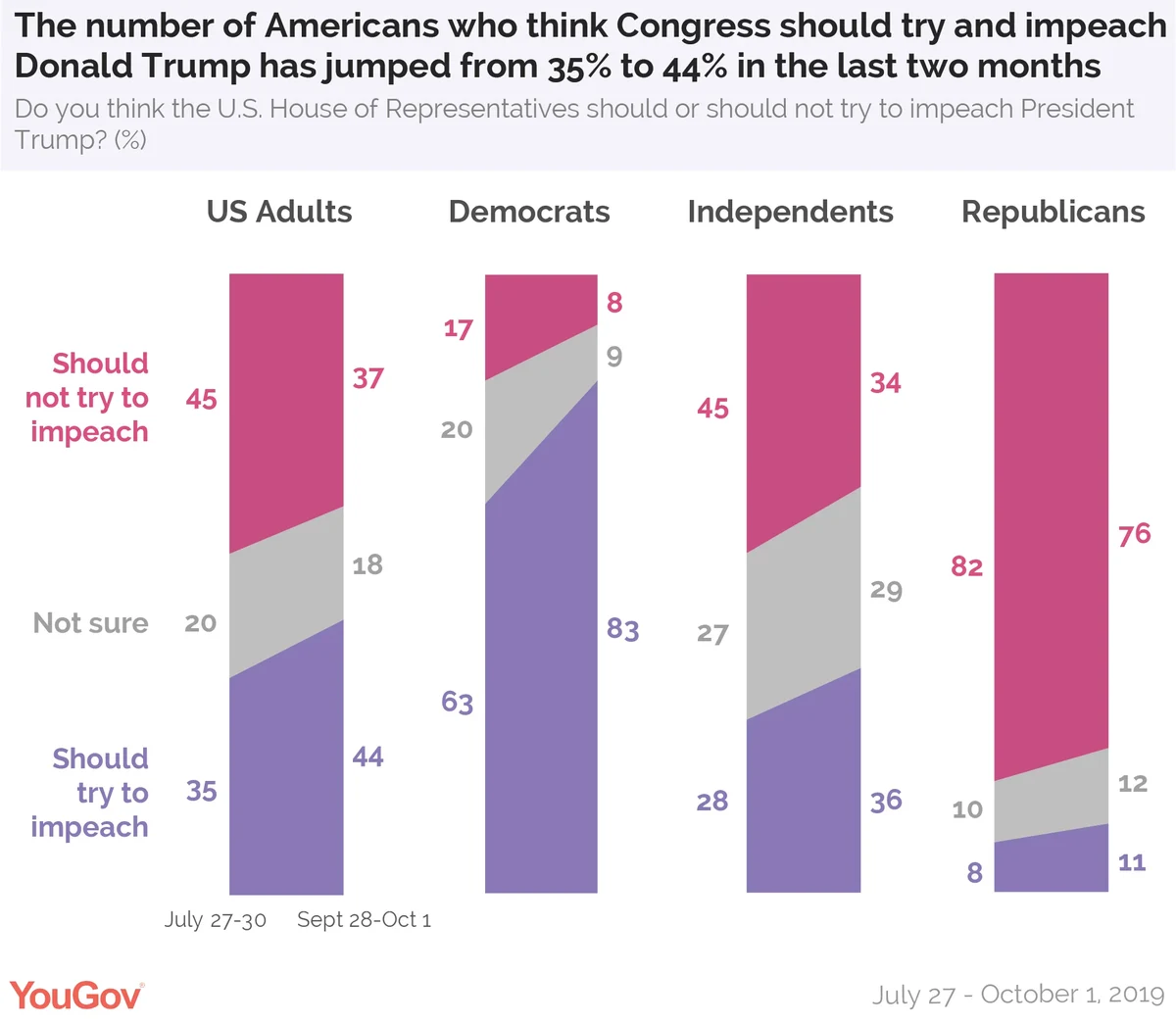Impeachment consideration has grown in the last two months. A plurality of Americans in the latest Economist/YouGov Poll now say the US House of Representatives should try to impeach President Donald Trump. Some Independents, who in July opposed an impeachment attempt, appear to have changed their minds, and Independents are now closely divided on the question.

The poll, conducted Saturday through early Tuesday morning, found the share of Independents supporting an impeachment attempt rose eight points, while Democratic support jumped 20 points. Republicans’ positions have shifted much less. The nature of the impeachment discussion has changed dramatically since the Economist/YouGov late July poll, conducted before the whistleblower’s complaint and the phone call to the Ukrainian President became public knowledge.
If the House of Representatives approves an impeachment resolution, Americans say the President should be removed from office by the Senate, and by a similar margin, 46% to 37%. Independents support removal in this circumstance 40% to 33%.
The reasons for impeachment acceptable to most Americans haven’t changed much in the last two months: most Americans believe that presidents should be impeached and removed from office if they commit perjury, obstruction of justice, abuse of power, or tax evasion. Contempt of Congress (which would be triggered by ignoring a Congressional subpoena) doesn’t quite rise to that level. 44% say a president should be impeached and removed for contempt of Congress, while 25% disagree. By more than two to one, Republicans say this is not an impeachable offense.
As for the specifics of this House impeachment investigation, for the moment partisanship matters. Republicans believe the President’s behavior on his phone call with the Ukrainian President was appropriate, and that the whistleblower complaint was not, while Democrats say the opposite. Independents side with the Democrats.
However, if the President threatened to withhold foreign aid from a country if the country refused to take an action benefiting a President, that would be different. Majorities of Democrats, Independents, and a plurality of Republicans (44%) would find that inappropriate. That has not specifically been indicated in the phone call summary.
Americans have become more attentive to this issue in the last week. Those who say they have heard “a lot” about the whistleblower complaint has nearly doubled, jumping from 29% to 52%. The opinion of Ukraine has also become more positive. This week, a majority (52%) regard it as a friendly nation or an ally, up 14 points from last week. Those who say it is unfriendly or an enemy dropped six points to 16%.
While some of the prominent figures in this story get mixed evaluations from Americans (for example, 37% have a favorable opinion of President Trump’s personal lawyer Rudy Giuliani while 41% are unfavorable). The whistleblower, whoever it is, is viewed positively by US adults overall (with Republicans disagreeing).
Americans are more likely to describe the whistleblower as "honorable" and "patriotic" than to call him or her a "traitor" (though 36% of Republicans would use that term, one the President may have implied, though he did not directly use). The jury is out on whether or not the whistleblower is considered as "hero" by Americans.
The President maintains his base: his approval rating this week remains stable: 41% approve and 50% disapprove. 86% of Republicans approve. So far, public expectations about his re-election have changed only a little. 47% say it is likely he will not win the 2020 election, while 36% find it unlikely.
Nearly two in three Democrats (up eight points) but only a third of Republicans say that is likely. But a successful impeachment seems less expected: only one in five (one in three Democrats and one in ten Republicans) say President Trump will not finish his current term of office. However, Democrats are twice as likely this week (35%) as last (17%) to think the President will leave office before his term is over.
Read the full toplines and table results from this week’s Economist/YouGov poll, and compare them to the survey from July 2019
Related: Elizabeth Warren: Among Democratic voters, she is well-liked and electable
Image: Getty








